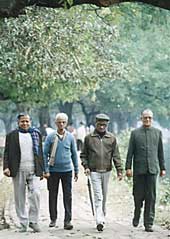|
|
| Alive and kicking |
There are things in life which we accept as gospel truths without ever questioning their veracity. Two such are that truth always triumphs (satyamev jayate) and honesty is the best policy. There are good reasons for accepting them at their face value but when I began to ponder over them, I began to wonder how much of it is wishful make-belief and how much proven reality. I concede that truth should always prevail and honesty should be the best policy, but do they in fact do so?
The scriptures answer the question in the affirmative. “Great is Truth, and Mighty above all things,” says the Bible (Apocrypha 4: 41). It might be recalled that the words are taken from Esdras which tells the story of King Darius of Persia who asked three young Jewish scholars what was the strongest thing in the world. The first one replied that it was wine, the second said the king was the strongest, the third said women were strongest and added a post-script: “But above all things Truth beareth away the victory.” It became an article of faith, its Latin form, magna est veritas, et prevalet — Great is truth and prevails. Its shortened form M.V.P. was often used as a motto on flags and shields, claiming that they were fighting for the truth).
Guru Nanak equated Truth with god. So did Mahatma Gandhi. Nanak put truthful conduct on an even higher pedestal: Sachhon orey sab ko/ Osper sachh aachaar (Truth above all;/ Above Truth, Truthful Conduct).
Gandhi went along with the guru inasmuch as he also made truthful conduct the central principle of his life. It should be evident that regarding honesty to be the best policy is part and parcel of his concept of truthful conduct. “To think good thoughts is one thing, to act upon them is another,” he wrote.
So convinced are we with such truisms that we also believe that anyone who transgresses the moral code pays a heavy price. Haraam kee kamaayee kabhi hazaam nahin hoti — what is earned illicitly can never be digested. As a matter of fact, we all know a lot of people who live very well with illicit earnings and do not have problems with their digestion. I know a few contemporaries who lied about their educational achievements, claimed to have a first or higher second divisions, when they actually had thirds, did well in their interviews, landed good jobs, and retired on fat pensions. No indigestion, no insomnia, they lived in good health into their eighties, respected by those not aware of the untruthful beginning, envied by those who do. Now turn your critical eye on your own law-makers. So many of them are “tainted” (this includes cheating, incitement to violence and murder). They may not all be respected but their being successful in life cannot be denied. So what exactly does satyamev jayate mean?
Don’t call me gerry
Whenever my son who lives in Mumbai was asked why he was going to Delhi, his reply was “to see my A. Pees.” AP stood for aged parents. Now that he is himself what in modern parlance is described a senior citizen, and his mother has passed away, he answers the same question saying “to see Old Pop”.
With the passing of generations, younger peoples’ attitude towards the old has changed. When I was a young man we used to describe aged people as oldies, or worse, sattriah bahattriah — feeble-minded in his seventies and seventy-twos. Now persons in their seventies are not regarded oldies, new attitudes and a sizeable vocabulary has been evolved to describe them. For one, their way to show respect to the aged is to keep a respectful distance from them. So we have old peoples’ homes, a good distance from homes they once lived in and ruled over. There is much to be said in favour of such homes. The few I have visited in England and the United States of America are as luxurious as any five-star hotel,they cost a packet. Inmates are happy blowing up their life’s savings to live out their last days in comfort because they are aware they can’t take anything with them when they go. Their offspring don’t grudge pitching in because they are relieved of the responsibility of looking after their parents and can get on with their own lives. The notion of a family gathered round the bed of a dying patriarch or matriarch is as dead as a dodo.
However much I approve of old peoples’ homes, I resent being described as a gerry (for geriatric), old boomer, fuddy duddy, gaffer or old fogey, codger, coot, or geezer. Some new coinages like dinosaur, fossil, cotton top, cranky, crumbly are downright offensive. Eighty years ago Chesterton wrote in his essay, “Prudery of slang”: “There was a time when it was customary to call a father a father...Now, it appears to be considered a mark of advanced intelligence to call your father a bean or a scream. It is obvious to me that calling the old gentleman “father” is facing the facts of nature. It is also obvious that calling him a “bean” is merely weaving a graceful fairy tale to cover the facts of nature.”
Call us oldies what you will, but bear in mind that you too will one day become an old person and slang like codger, or fuddy-duddy can hurt even an oldie hard of hearing.
There’s a ghost in the car
This guy was hitchhiking on a real dark night in the middle of a thunderstorm. Time passed slowly and no cars went by. It was raining so hard he could hardly see his hand in front of his face. Suddenly he saw a car slowly approaching and appearing ghost-like in the rain. It slowly crept towards him and stopped.
Wanting a ride real bad, the guy jumped in the car and closed the door. Only then did he realize that there was nobody behind the wheel. The car slowly started moving and the guy was terrified, too scared to think of jumping out and running. He saw that the car was slowly approaching a sharp curve. He started to pray and beg for his life; he was sure the car would go off the road and into the bayou and he would surely drown, when just before the curve, a hand appeared through the driver’s window and turned the steering wheel, guiding the car safely around the bend. Paralyzed with fear, the guy watched the hand reappear every time they reached a curve. Finally the guy, scared to near death, had all he could take and jumped out of the car and ran to town. Wet and in shock, he went into a bar and ordered two shots of whiskey, then told everybody about his supernatural experience.
About half an hour later two guys walked into the bar and one says to the other, “Look friend, that idiot that rode in our car when we was pushing it in the rain.”
(Contributed by Amir C. Tuteja, Washington)












